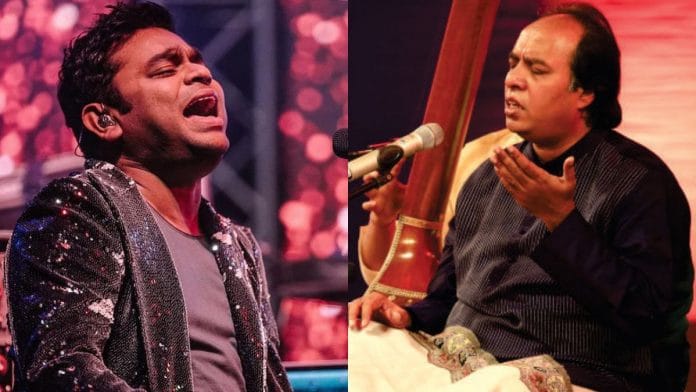New Delhi: Strains of a Dhrupad composition reverberated within the chamber of the Delhi High Court on Friday. It’s not every day that judges, lawyers, plaintiffs and defendants get the opportunity to listen to classical music in the workplace. But when the lawsuit is filed by Dhrupad maestro Ustad Wasifuddin Dagar against Oscar-winning music composer AR Rahman for allegedly ‘lifting’ his composition, music becomes a key piece of evidence.
Dagar claims that Rahman has ‘copied’ his family’s Dhrupad composition, Shiva Stuti, for the song Veera Raja Veera in the Tamil blockbuster Ponniyin Selvan-2, and Friday marked the first day of the hearing in court. Dagar has filed a suit for violation of his copyright and moral rights and for pirating the work of his father, Ustad Faiyazuddin Dagar and uncle, Ustad Zahiruddin Dagar. Apart from Rahman, he has named Mani Ratnam’s company Madras Talkies—which produced PS-1 and PS-2—Lyca Productions, Tips Industries Limited, and two singers.
ThePrint was the first to report on this ‘ownership battle’ in April this year when Dagar heard the song after its release.
Justice Pratibha M Singh, who was hearing the case, asked for both compositions to be played in court—the Shiva Stuti composed in Raag Adana by Dagar’s father and uncle, as well as Rahman’s rendition of the same song in Raag Adana.
After listening to both compositions, she remarked that there was no doubt that the beats and the notes were very similar. Following arguments by both sides, she instructed Rahman’s legal team to produce raw recording and response to the notations submitted by plaintiff.
Incidentally, Veera Raja Veera was also sung by two of Dagar’s former students, Arman Ali Dehlvi and Shivam Bhardwaj. Summons have been issued to them, too, and the next hearing has been scheduled for 7 November.
Moreover, the YouTube video of the song, produced by Hindi Music company TIPS, erroneously attributes it to ‘Dargavani’ tradition Dhrupad when it should be ‘Dagarvani’ – a style of music invented and pioneered by the Dagar gharana. Justice Singh directed the defendants to fix this ‘acknowledgement’ within 48 hours.
Dagar was represented by advocates Neel Mason and Arjun Harkauli, while former Advocate General of Tamil Nadu PS Raman represented Mani Ratnam.
Raman suggested mediation between the two parties. However, the Judge noted that when the plaintiff and his team tried to reach out to the defendants, they were left disappointed.
“In these kinds of matters, they did the right thing by reaching out to you. What was unfortunate, if I may say so, that there was no positive response from your side,” Justice Singh said.
Also read: Did AR Rahman ‘lift’ Dagar’s Shiva Stuti for PS2 Veera Raja? A new music ownership battle
The ownership battle
What’s at stake is the ownership and copyright of folk and classical songs that form the basis of modern compositions, which evoke popular ragas.
The Ustad heard the song Veera Raja Veera on YouTube for the first time in April and was shaken by the uncanny similarities to his family composition. At the time, he wrote a personal letter to Rahman about it.
Dagar and his students, who had spoken to ThePrint earlier, were also upset that no credit was initially given to the gharana in the song’s YouTube video description. The current acknowledgement was inserted some 10 days later, but the Dagar family’s name was misspelt.
A phone call also happened between Dagar and Rahman in April before the film’s release, where he was assured of “further conversation”. But nothing came of it.
The Ustad finally had to send a legal notice. On the day of PS-2’s release, lawyers from Madras Talkies countered Dagar with another legal notice, rejecting the claim that Veera Raja Veera was a copy of Shiva Stuti. The company also accused Dagar of “seeking monetary gain” and warned of legal action if he continued with his actions.
However, the Ustad has only been demanding proper acknowledgement of his father and uncles’ composition. The oldest recording of the composition dates back to 1978 – a live concert by the Junior Dagar Brothers at the Royal Tropical Institute in The Netherlands. Other members of the Dagar gharana, as well as other Dhrupad singers, also later performed the Shiva Stuti, making it a popular composition in the Raag Adana.
(Edited by Zoya Bhatti)






